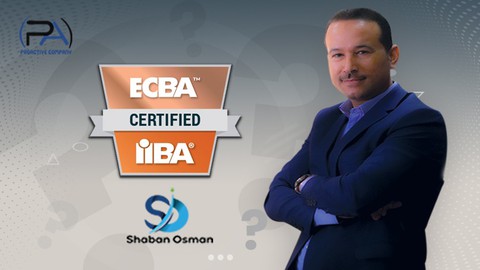Description
If you are a professional looking to enhance your skills and improve your career prospects, then the Entry Certification in Business Analysis (ECBA) course offered by the International Institute of Business Analysis (IIBA) might be just what you need.
This comprehensive course is designed to teach the basics of business analysis and is suitable for those who are new to the field or are working in junior business analyst roles. The course covers the Business Analysis Body of Knowledge (BABOK) and requires 21 hours of training, adherence to a code of conduct, and an hour-long online test.
But why should you consider taking this course? In this article, we’ll explore the benefits of the (IIBA-ECBA) Entry Certification in Business Analysis Course for professionals across industries.
Joining the Business Analysis Profession
One of the primary reasons to take the ECBA course is to enter the business analysis profession. This certification provides a way for individuals from a variety of backgrounds to transition into the field and start building their careers as business analysts.
Preferred Integration in the BA Selection Process
Another benefit of ECBA certification is that it gives you an advantage when being considered for BA positions. Employers often prefer candidates who have completed this certification as it proves that they possess the necessary skills and knowledge to be effective business analysts.
Greater Confidence at Work
For professionals already working in business analysis roles, completing the ECBA certification can provide a boost in confidence. The course covers fundamental concepts and techniques used in the profession, allowing you to build your knowledge base and improve your performance.
What You Will Learn
If you decide to pursue the (IIBA-ECBA) Entry Certification in Business Analysis Course, you will gain a comprehensive understanding of the following:
- The established business analysis practices outlined in the BABOK
- The four knowledge areas, including BA Planning and Monitoring, Elicitation and Collaboration, Requirements Life Cycle Management, and Requirements Analysis and Design Definition.
- The terminologies used in the BABOK
- The role, competencies, and skillsets required to become an effective and result-oriented business analyst
- Effective stakeholder management techniques
- The principles and practices of business analysis
- How to identify and apply various tools and 50 BABOK V3 techniques in business analysis scenarios
These skills are essential for any business analyst looking to succeed in their role and make a meaningful impact on their organization.
Conclusion
Overall, the (IIBA-ECBA) Entry Certification in Business Analysis Course is an excellent investment for professionals looking to enhance their skills, transition into the business analysis profession, or gain an advantage in the job market.
With the skills, knowledge, and confidence you will gain from this certification, you will be well-equipped to excel as a business analyst and make meaningful contributions to your organization.











Reviews
There are no reviews yet.